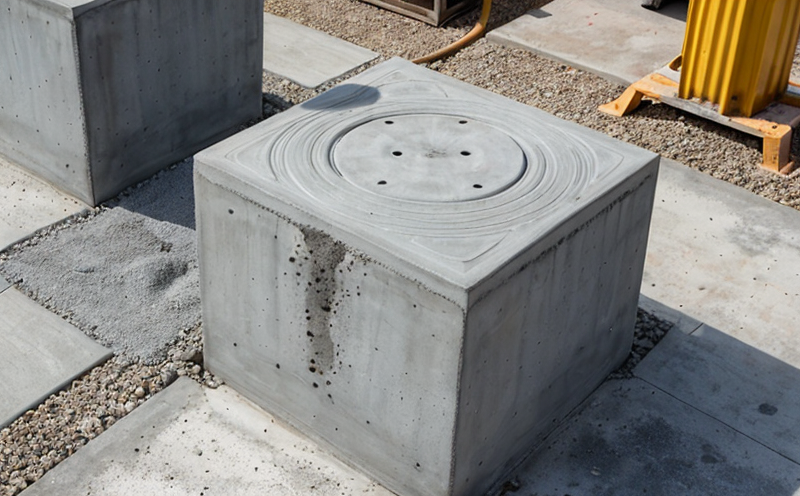EN 12390 – Compressive Strength Correlation Testing
The EN 12390 series of standards is pivotal in the realm of concrete and cement testing. This service, specifically EN 12390-4, focuses on correlating compressive strength test results obtained using different methods—both destructive and non-destructive—for quality assurance purposes in building & infrastructure projects.
The primary goal of this service is to ensure that the compressive strengths determined by various testing techniques are comparable. This correlation is crucial for maintaining uniformity across diverse construction sites, adhering to international standards, and facilitating accurate material specification and quality control processes. The service encompasses a comprehensive range of methodologies, including but not limited to:
- Standard cube testing
- Cylinder testing
- Slit specimens testing
- Non-destructive ultrasonic pulse velocity (UPV) and rebound hammer methods
The correlation of these different test results is achieved through a rigorous process that involves the following steps:
- Test Preparation: Specimens are prepared in accordance with EN 12390-4 guidelines. This includes ensuring standard dimensions and curing conditions to minimize variability.
- Cubes: Dimensions should be precisely 15 cm × 15 cm × 15 cm
- Slit Specimens: Specific dimensions are defined in the standard, focusing on the length-to-width ratio for accurate testing.
The service ensures that all tests meet stringent acceptance criteria set forth in EN 12390-4, which include:
- Accuracy within specified tolerances for each test method
- Consistency between different testing methods
- Repeatability and reproducibility of results
The importance of this service cannot be overstated, especially in large-scale construction projects where uniformity is critical. By ensuring that all test methods yield comparable results, EN 12390-4 facilitates seamless integration of diverse testing approaches.
Our comprehensive approach to EN 12390-4 ensures that clients receive accurate and reliable data essential for decision-making processes in construction projects. This service is indispensable for quality managers, compliance officers, R&D engineers, and procurement professionals aiming to adhere strictly to international standards.
Applied Standards
The service adheres to the following internationally recognized standards:
- EN 12390-4: Correlation of compressive strength test results obtained from different methods for concrete in structures
- ASTM C678/C678M – Standard Practice for Concrete Cylinder Compressive Strength Test
- AASHTO T351 – Standard Method for Determining Flexural Strength of Concrete by Beam Method
- ISO 20476:2019 – Specification for the performance, durability and environmental impact of concrete in buildings
The application of these standards ensures that our testing methods are consistent with global best practices. This alignment is crucial for projects involving international collaboration or compliance with international regulations.
Quality and Reliability Assurance
Ensuring the highest quality and reliability in test results is at the core of our service offering. We employ state-of-the-art equipment calibrated according to international standards, ensuring precision and accuracy. Our team of experts maintains strict adherence to EN 12390-4 guidelines throughout the testing process.
The following measures are taken to uphold quality:
- Calibration and Maintenance: All equipment is regularly calibrated and maintained by certified professionals.
- Data Validation: Test data undergoes rigorous validation to ensure accuracy and reliability.
- Traceability: Results are traceable back to the standard methods, ensuring consistency with international norms.
We also provide detailed reports that include all relevant test parameters, specimen preparation details, and statistical analyses. These reports are indispensable for clients seeking transparency and confidence in their testing processes.
Use Cases and Application Examples
- New Construction Projects: Ensures the structural integrity of new concrete structures by correlating various test methods.
- Detecting potential issues in early-stage construction to prevent costly rework.
- Providing data for design optimization and future projects based on proven testing methodologies.
- Retrofitting Projects: Guarantees the adequacy of existing structures by cross-referencing test results against EN 12390-4 standards.
- Evaluating the effectiveness of retrofitting measures and ensuring compliance with building codes.
- Supporting long-term maintenance plans through reliable data on material performance over time.
- Research and Development: Facilitates the development of new concrete formulations by correlating test results across different methods.
- Identifying optimal mix designs for specific project requirements.
- Pioneering sustainable construction practices through advanced testing techniques.
The versatility of this service makes it applicable to a wide range of projects, ensuring that all stakeholders can rely on accurate and consistent test results.





